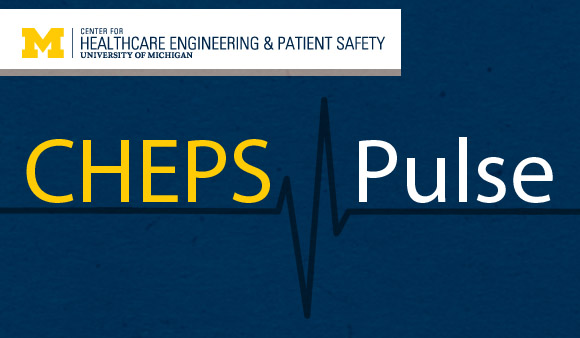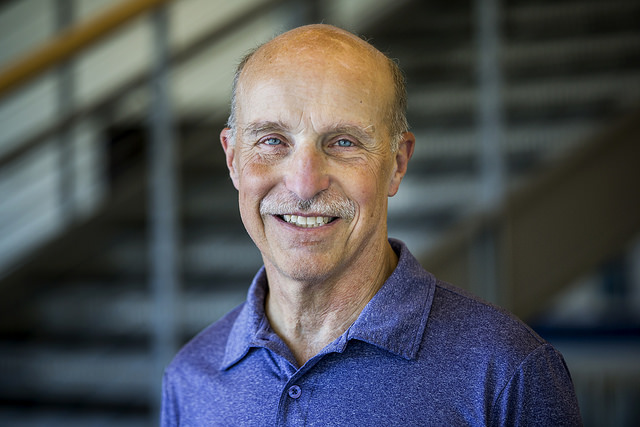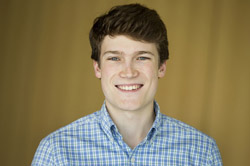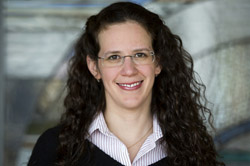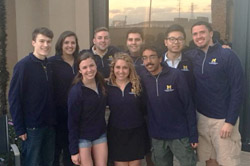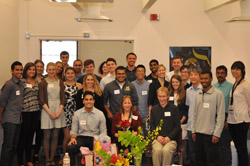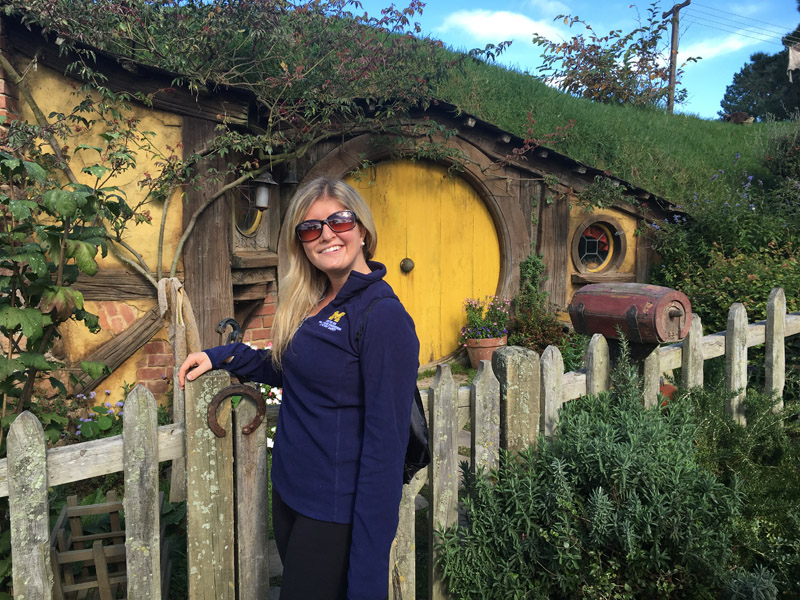In This Issue
Message From Jim Bagian, CHEPS Director
Alumni Spotlight: Matt Rouhana
Faculty Spotlight: Mariel Lavieri
Conference Connections
Recent News
The Week In CHEPS
Upcoming Events
Where In The World Is CHEPS?
Message From Jim Bagian, CHEPS Director
I’m pleased to use the inaugural issue of our newsletter to introduce you to just a few of the people who make CHEPS what it is.
Matt Rouhana is a recent graduate of our master’s concentration. You’ll have the opportunity to read about his time at CHEPS and how he’s using what he learned here to start a promising career as a Performance Improvement Consultant in the Henry Ford Health System.
Mariel Lavieri, who has been an affiliate of CHEPS since not long after the Center was established, is helping get girls interested in healthcare engineering at a young age through an emergency department simulation. You can read more about the simulation as well as Mariel’s research on the intersection of operational planning and medical decision making in the article below.
At the heart of CHEPS are our students. Attending conferences and presenting their work is an integral part of their time here at the Center. It’s a pleasure to see them learn and grow as they present their work and have a chance to see what their colleagues are working on. Our feature story looks at the experience of Billy Pozehl, an alum of the HEPS master’s program and now a Research Area Specialist Associate at CHEPS, who has presented at several professional conferences, and Ajaay Chandrasekaran, an undergraduate who gave his first presentation at a conference this summer.
I hope you enjoy learning a little bit more about what’s going on here at CHEPS in this newsletter. If you have suggestions about what you’d like to see us feature in future issues, please get in touch at [email protected]. You can also follow us on Twitter to get a glimpse of day to day life in the Center at @UofMCHEPS.
There are many exciting projects underway at CHEPS and I look forward to keeping in touch with all of you to keep you up to date. Be on the lookout for more news from us throughout the year!
James Bagian MD, PE, CHEPS Director
Alumni Spotlight: Matt Rouhana
Matt Rouhana began working at the Center for Healthcare Engineering and Patient Safety (CHEPS) in May, 2014 while still an undergraduate in Industrial and Operations Engineering (IOE), and since then, has been a vital member and strong advocate of the program. Matt explained, “Working at CHEPS had a profound influence on shaping my own professional goals and plans for the future. Working on healthcare problems was so interesting and rewarding that it prompted me to complete my master’s degree in IOE with a HEPS concentration.” Matt graduated in April, 2016 with his master’s degree in IOE and a concentration in Healthcare Engineering and Patient Safety (HEPS).
When asked what made CHEPS so unique, he answered, “It’s the people. They made every day at CHEPS rewarding. Everyone at CHEPS is driven and smart, eager to work on interesting problems and to help others. Everyone enjoyed the work, and the environment was great as a result.” Matt also remarked on the incredible diversity present within CHEPS and how the uniquely “diverse team means everyone can bring a different perspective to the table, and this kind of multi-faceted approach to problem solving can be invaluable.”
During his tenure at CHEPS, Matt was a key member of multiple projects including Pediatric Disposition and Flow (PDF), Metabolism Endocrinology and Diabetes (MEND), and Provider Scheduling. However, Matt’s primary project focus was the Chemotherapy (Chemo) Project, which he worked on throughout his time at CHEPS.
The Chemo project is a collaborative effort between the University of Michigan Cancer Center and CHEPS aimed at improving the patient experience and Cancer Center process. The scope of this work includes a holistic view of the multiple department process: phlebotomy, clinic, pharmacy, and infusion. Matt and his work have made great contributions to this project. Matt said, “Probably the biggest success [of my work at CHEPS] has been helping to get the phlebotomy simulation to the point where we can now use it to better understand the phlebotomy area and hopefully make decisions as to how to improve it.”
Moving forward, Matt hopes to apply some of the principles and knowledge that he gained from his time at CHEPS to his new position at Henry Ford Health System where he will be a Performance Improvement Consultant. “Working with healthcare professionals has really widened my perspective on the healthcare system as a whole,” he said. “I don’t approach healthcare problems as ‘engineering problems’ now, but rather as a problem that engineering principles can be applied to.”
After his time working with healthcare professionals with CHEPS, Matt said his approach to tackling problems has changed and that “in many ways, working with healthcare professionals has given me perspective on engineering.” Matt is already realizing how much the knowledge and experiences he has gained from his time at CHEPS will help him succeed in a career in healthcare.
CHEPS would like to thank Matt Rouhana for all his hard work and dedication, congratulate him on his recent graduation and wish him all the best in his current and future endeavors!
Faculty Spotlight: Mariel Lavieri
Mariel Lavieri joined the University of Michigan’s Industrial and Operations Engineering (IOE) Faculty in 2009 and became a CHEPS affiliate not long after the Center’s inception. She is a recent recipient of the prestigious National Science Foundation (NSF) Faculty Early Career Development (CAREER) grant to fund her research on the intersection of operational planning and medical decision making.
Her research focuses on developing a unified methodology towards chronic disease screening. This includes when and how to screen, monitor, and treat patients with chronic diseases. Through optimal screening, monitoring, and treatment decisions over a patient’s lifetime, there is a secondary objective of improving resource allocation.
Professor Lavieri currently works with collaborators from the Kellogg Eye Center, Veterans Affairs, University of Michigan Health System (UMHS), as well as many others hospitals and universities in the US and Canada. Along with clinicians, hospital administrators, and managers, she is applying the framework to glaucoma, bladder cancer, liver cancer, organ transplantation, and coronary heart disease. She anticipates that these methodologies could be applied to other chronic diseases as well.
When asked how working with numerous healthcare professionals impacted her views on problem solving, she said it’s helped her realize that “there are many interesting technical problems, yet it is important to thoroughly understand the problem and data available before answering them.”
She has also started working on concussion diagnostics as well as management of players who are suffering from concussions. Professor Lavieri is “excited about being able to make a significant impact in the field and to have the potential to change lives.”
Another way she’s making a significant impact is through her promotion of science and engineering to young women, girls, and underrepresented minority groups at all levels. One of her endeavors is an emergency department simulation which teaches industrial engineering concepts to girls in under-served schools in the Detroit-Metropolitan area. In the simulation, girls play the roles of everyone in a hospital, including doctors, nurses, and patients. The simulation helps girls learn concepts of industrial and operations engineering.
“When they go and they try to move patients through the hospital, not everything works perfectly the first time. So they run this game once and, as they run it, they learn about it,” said Professor Lavieri. “And I ask them, ‘If you had one single resource that you could add to that emergency department, what would that be?’ In that I’m trying to teach them a few concepts. For example I’m trying to teach them the idea of bottlenecks. So it’s not ideal to add resources everywhere, you want to add them in specific places. I’m trying to teach them about queuing, when patients are waiting in queues to enter the emergency department to receive different services. I’m also trying to teach them about optimum use of resources. So they get to choose what resource they would add, and then they run the game again and they get to see the impact that choosing the appropriate resources would have.”
She runs these simulations in collaboration with Women in Science and Engineering (WISE), and FEMMES (Females Excelling More in Math, Engineering, and Science) along with CHEPS Associate Director Amy Cohn. CHEPS students often assist with running the emergency department simulation. She’s is also an active proponent in the Diversity Initiative in the IOE Department which strives to address the disparity of underrepresented STEM minorities through a seminar series and department sponsored diversity activities.
We look forward to future collaborations with Professor Lavieri, and would also like to congratulate her on all her hard work and her recent promotion to Associate Professor!
Conference Connections
CHEPS had a record month this May, sending 9 students to two conferences across the country, giving 8 presentations. From May 5 – 9, 2016, several CHEPSters attended The Production and Operations Management Society (POMS) annual conference in Orlando, Florida. From May 21 -24, 2016, another CHEPS cohort represented at The Industrial and Systems Engineering Research Conference (ISERC) in Anaheim, California at the Disneyland Resort Hotel.
Attending conferences is an integral part of the CHEPS experience. It’s a chance to grow as an individual with professional skills, confidence and networking, but also a chance for the Center to share work and learn from colleagues from a variety of locations and backgrounds. As CHEPster Billy Pozehl stated, “Conferences provide an incredible platform for spreading awareness, knowledge, and understanding. Being able to convey your work clearly and succinctly to both technical and non-technical audiences is such a critical professional skill, and that makes these conference trips invaluable.”
Billy Pozehl has been working at CHEPS since 2012. He is an alum of the HEPS master’s concentration (a concentration in Healthcare Engineering and Patient Safety for Industrial and Operations Engineering master’s students) and is now a Research Area Specialist Associate at CHEPS. Since he first started working at the Center, he has been able to attend a total of 10 conferences — often with a presentation, a poster, or both. At ISERC he presented on the block scheduling work CHEPS is doing with Pediatrics, Medicine-Pediatrics, and Internal Medicine. As a conference veteran, a mentor for more rookie attendees, and a believer in the importance of conferences, it is no surprise that Billy said, “I love the work we do at CHEPS and I love being able to share it with others. It’s important that we spread our work so that others can take that knowledge back to their institutions. It’s cool to realize that my presentation might lead to improvements at hospitals across the country and on the other side of the world.”
Ajaay Chandrasekaran is undergraduate in Computer Science in Engineering and has been working at CHEPS for just over a year. While he had the opportunity to present a poster at the Houston Society for Health Systems (SHS) conference in February, ISERC was his first time giving a research presentation at a conference. He commented, “It was pretty nerve-wrecking at first.” However, his preparation and knowledge led to an extremely successful experience and Ajaay ultimately stated, “The actual presentation was painless and vibrant.”
While some of the success of a presentation lies in the hands of those presenting, CHEPS works hard to provide a collaborative environment that fosters teamwork and mutual achievement in a way that helps everyone prepare for and succeed at conferences (and in their projects overall). As Billy explains, “The team at CHEPS provides support for student presenters in numerous ways. From early on, the faculty and team members help the students determine a clear, coherent story that they want the presentation to tell. From there, CHEPS supports the students in whatever they need to build the story up and offers several opportunities for the presenters to practice their talks in front of audiences both familiar and unfamiliar with the topic. The feedback during this process is so useful for refining content, rehearsing language, and deepening everyone’s understanding of the topic.”
Ajaay further explains, “My fellow teammates and CHEPS affiliates provided detailed feedback for every one of my slides and talking points. Receiving their suggestions and positive vibes significantly boosted my morale. The students and faculty at CHEPS are very supportive in listening to practice presentations and are unreserved in providing feedback for improvement. I am very grateful to them.”
Whether a seasoned presenter or first timer, there’s no question, the opportunities CHEPS presents so many of its affiliates is a unique one. As Billy explained, “One of my favorite things that we do at CHEPS is give students the opportunity to attend and present at conferences even as undergraduate students. I am not aware of many other research groups that are able to provide such experiences to their students at such an early stage.”
Ajaay further expressed this sentiment when he remarked on the value of attending such conferences. He stated, “It’s valuable to see my team’s work sit among a variety of other presentations. Being able to present is a reminder that our work is entering the existing conversation of research, a conversation that crosses borders and disciplines.” With a mission statement focused on multi-disciplinary work, these takeaways could not be more in line with the goals of CHEPS.
Billy also commented on the value of attending the conferences, “The most valuable thing about attending conferences is learning. There is such a wealth of research across so many fields and applications. I’ve met so many incredible people and taken away so much from those interactions over the last few years attending conferences! It’s been really neat watching colleagues’ research grow and morph from conference to conference, and I love bringing back to CHEPS the cool ideas that their presentations spark for ways we can improve our own projects.”
CHEPS is proud and pleased with the learning and growth that these conferences have prompted. Be sure to look for our group in their CHEPS fleeces at the next conference!
Recent News
Chemo Project Paper Published
Merrill Bonder Visits CHEPS
Jim Bagian Quoted in Politico Pro Article
CHEPS Travels to POMS Conference
Rod Capps Wins Staff Service Award
CHEPS Summer Welcome
Students Get Clinical Observation 101
Dr. Vedat Verter Lunch & Learn
Moses Chan Piano Trio Recital
Mixer with IHI-OS
Week in CHEPS
Week in CHEPS June 10, 2016
Week in CHEPS June 3, 2016
Week in CHEPS May 27, 2016
Week in CHEPS May 20, 2016
Upcoming Events
Symposium on Healthcare Engineering and Patient Safety, September 26 at 5pm
Where in the World is CHEPS
CHEPS alum Brittany Lopez showing her CHEPS pride at Hobbiton, the set of The Shire in Lord of the Rings, in New Zealand. She’s pictured wearing her CHEPS fleece in front of Samuel’s house called a “hobbit hole.”
See More Where in the World is CHEPS entries on our webpage.
The CHEPS Newsletter team is: Elizabeth Olin (HEPS master’s program), Pranjal Singh (HEPS master’s program), Elizabeth Fisher (staff)
Thank you to all the CHEPS students who suggested names for our new newsletter and congratulations to Brian Lemay who suggested the chosen name, CHEPS Pulse, and to Katherine Adams whose suggestion inspired our subtitle!

